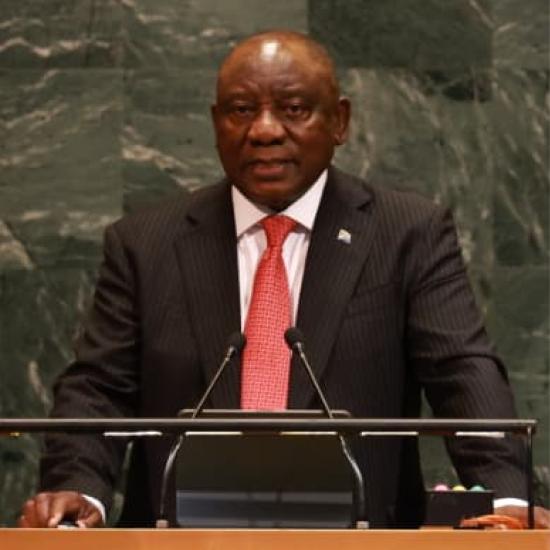President Ramaphosa calls
for an end to Gaza conflict

President Cyril Ramaphosa recently addressed the 80th United Nations General Assembly (UNGA), where he stressed the importance of taking action to stop the conflict in Gaza.
“Israel is committing genocide in Gaza. Just last week, the UN Independent International Commission of Inquiry found that Israel is responsible for the commission of genocide in Gaza. As Palestinians continue to face genocide and famine, we have a duty to act,” said the President in his address.
His remarks came in the wake of a report by the UN Independent International Commission of Inquiry that found Israel responsible for acts of genocide against Palestine.
President Ramaphosa emphasised the need for international cooperation and solidarity in addressing global challenges.
Reflecting on the founding principles of the UN, he reminded the assembly that the organisation was established “to save succeeding generations from the scourge of war and build a peaceful, prosperous and just world arising from the devastation brought about by global conflict”.
He cited the UN Secretary-General António Guterres, who recently reported that global military expenditure has reached historic highs just as the world is falling behind on its core development promises.
“We are building weapons when we should be building social infrastructure. We must act decisively to silence all guns, everywhere, to realise the goal of sustainable development and global peace”.
Eradicating poverty and inequality
He stressed that it is essential now more than ever to uphold the values of the UN.
“We are called upon to advance cooperation and solidarity between nations,” he said as he highlighted South Africa’s commitment to eradicate poverty and inequality both domestically and across the African continent.
As South Africa gets ready to host the G20 Leaders’ Summit for the first time on African soil in November, President Ramaphosa emphasised the theme of this year’s presidency: “Solidarity, Equality, and Sustainability”.
He highlighted the ongoing challenges in achieving the Sustainable Development Goals, attributing the obstacles partly to the insufficient financial resources available in developing economies.
Many countries in the Global South, particularly in Africa, are grappling with high debts, which inhibit investments in health and education.
“They are indebted and are paying more on debt servicing than they do on health and education,” Ramaphosa added, advocating for “fairer lending rules” to help these countries meet their development goals.
The President also highlighted the need for reform in international financial institutions to address global challenges better, emphasising that “the multilateral trading system needs to be reformed”.
Global trade
The President reaffirmed the World Trade Organisation’s essential role in managing trade differences but expressed concern over geopolitical shocks and trade policy volatility threatening global economic stability.
“Unilateral trade practices and economic coercion have a detrimental impact on many nations,” he stated, specifically calling for an end to the long-standing economic embargo against Cuba, which he characterised as having caused “untold damage to the country’s economy over the years”.
On the other hand, the President pointed to the African Continental Free Trade Area as a model for sustainable economic growth and cooperation.
He also announced the launch of an Extraordinary Committee of Independent Experts on Global Wealth Inequality, chaired by Nobel laureate Professor Joseph Stiglitz.
This committee is tasked with delivering a report on global inequality to G20 leaders, signifying South Africa’s proactive approach to addressing pressing global economic disparities.
Climate change
Shifting his focus to climate change, the country’s Head of State warned that this is an existential threat.
“We are failing future generations by our inability to reduce global warming.”
He stressed that while Africa contributes least to climate change, it bears the brunt of its effects, witnessing extreme weather events that exacerbate food insecurity and displace populations.
“Extreme weather events like floods and droughts are driving food insecurity, displacing populations, causing damage to infrastructure and leading to the unnecessary loss of livelihoods”.
He called Member States to honour their undertakings and commitments in line with the guiding principle of common but differentiated responsibilities and respective capabilities.


